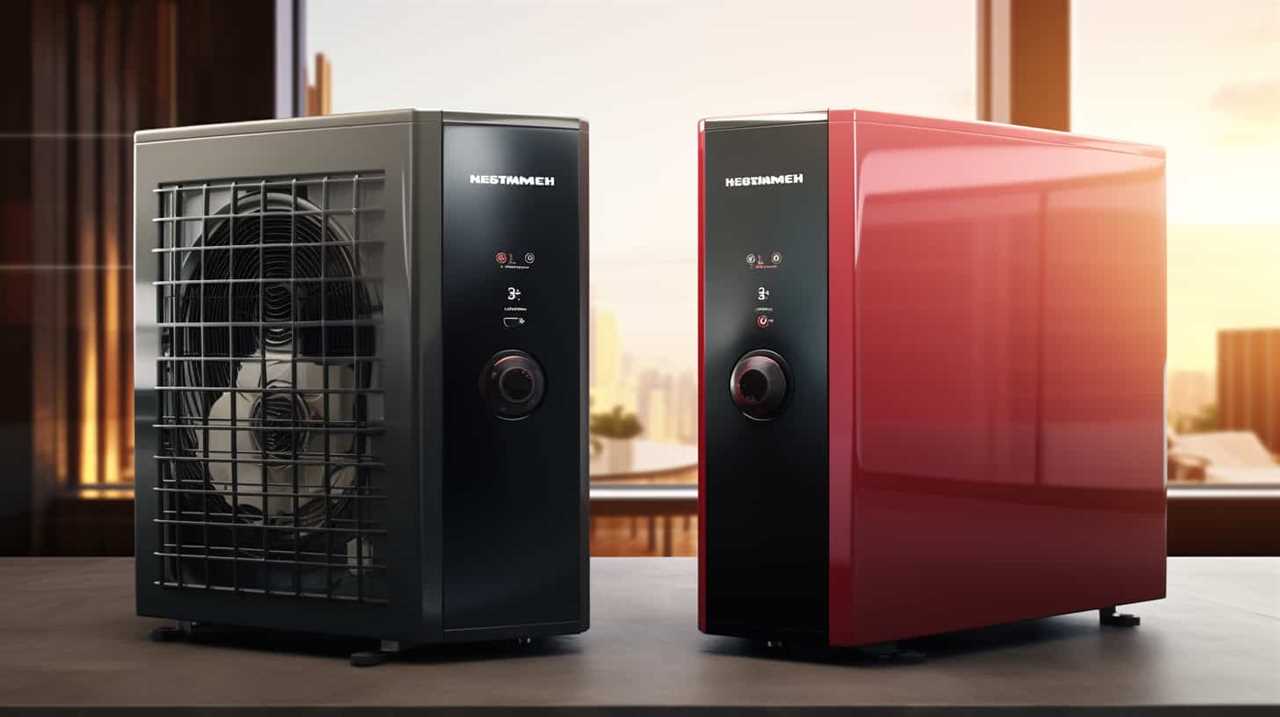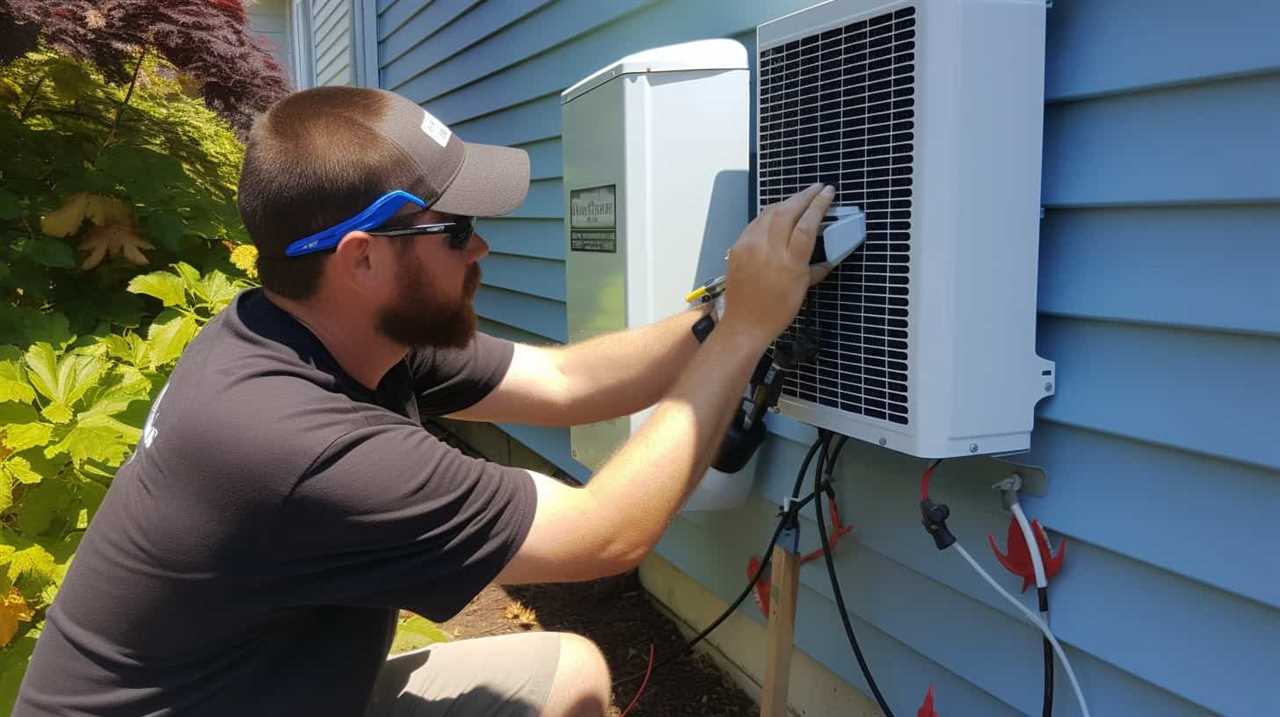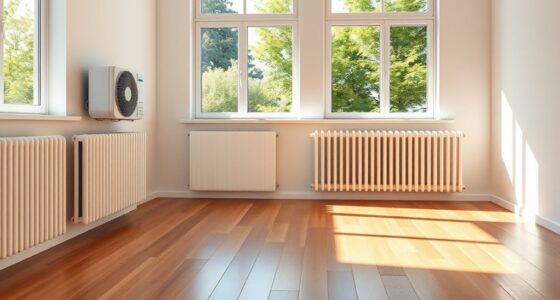The adage ‘Out with the old, in with the new’ is familiar to all of us. Regarding home heating, embracing heat pumps is the epitome of adopting the future.
In this curated guide, we’ll explore the advantages, technology, efficiency, and maintenance of heat pumps.
Get ready to discover a practical and innovative solution that will not only keep your home warm but also save you money in the long run.
Let’s dive in!

Key Takeaways
- Heat pumps offer energy efficiency, resulting in lower utility bills.
- They provide both heating and cooling, making them suitable for year-round comfort.
- Homeowners can set and maintain their desired temperature consistently.
- Heat pumps operate quietly and require minimal maintenance.
The Advantages of Heat Pumps for Home Heating
We love heat pumps because they offer numerous advantages for home heating. With advancing technology, heat pumps have become an innovative solution for efficient and eco-friendly heating.
One of the key advantages of heat pumps is their energy efficiency. Heat pumps work by transferring heat from one place to another, rather than generating heat from a fuel source. This means they consume less energy and result in lower utility bills.
Additionally, heat pumps can provide both heating and cooling, making them versatile for year-round comfort. They also offer precise temperature control, allowing homeowners to set their desired temperature and maintain it consistently.
Furthermore, heat pumps operate quietly and require minimal maintenance, making them a convenient and hassle-free option for home heating.

Understanding the Technology Behind Heat Pumps
As we delve into the topic of understanding the technology behind heat pumps, it is important to explore how these systems work and the components that make them so efficient. Heat pump operation involves the transfer of heat from one place to another, using a refrigerant and a compressor. The refrigerant absorbs heat from a cold source, such as the outdoor air, and then releases it to a warm source, such as the indoor air. This transfer of heat is achieved through a cycle of evaporation, compression, condensation, and expansion.
To give you a better understanding, here is a table outlining the main components and their functions in a heat pump system:
| Component | Function |
|---|---|
| Evaporator | Absorbs heat from the cold source, evaporating the refrigerant |
| Compressor | Increases the pressure and temperature of the refrigerant |
| Condenser | Releases heat to the warm source, condensing the refrigerant |
Heat pump installation involves careful positioning of these components and proper sizing to ensure optimal performance. Additionally, insulation and air sealing are crucial for minimizing heat loss or gain in the system. By understanding the technology behind heat pumps, homeowners can make informed decisions about their installation and maximize the efficiency and effectiveness of their heating system.
Energy Efficiency and Cost Savings With Heat Pumps
Using heat pumps for home heating can result in significant energy efficiency improvements and cost savings. Here are four reasons why heat pumps are a smart choice for environmentally conscious homeowners looking to save on energy costs:

-
Energy savings: Heat pumps transfer heat instead of generating it, making them much more efficient than traditional heating systems. This can lead to substantial energy savings and lower utility bills.
-
Reduced environmental impact: Heat pumps operate using electricity, which can be sourced from renewable energy. By using a heat pump, you can reduce your carbon footprint and contribute to a cleaner environment.
-
Lower operating costs: Heat pumps require less maintenance and have longer lifespans compared to other heating systems. This means fewer repair and replacement costs over time.
-
Government incentives: Many governments offer financial incentives and tax credits for installing energy-efficient heating systems like heat pumps, further reducing the upfront cost.

Considering these energy savings and environmental benefits, it’s important to consider certain factors when choosing a heat pump for your home.
Factors to Consider When Choosing a Heat Pump for Your Home
When selecting a heat pump for our home, there are several factors to consider. One of the most important factors is the installation process. It’s crucial to choose a heat pump that’s easy to install and doesn’t require extensive modifications to your home. Look for models that offer simple and straightforward installation instructions, as this will save you time and money.
Another factor to consider is the environmental impact of the heat pump. Look for models that are energy-efficient and use environmentally friendly refrigerants. This won’t only reduce your carbon footprint but also lower your energy bills in the long run.
Tips for Proper Maintenance and Troubleshooting of Heat Pumps
Two important tips to keep in mind for maintaining and troubleshooting heat pumps are regularly cleaning or replacing air filters, and promptly addressing any unusual noises or performance issues. Proper maintenance is essential for maximizing the efficiency and lifespan of your heat pump.

Here are some tips to help you with heat pump maintenance:
-
Clean or replace air filters every 1-3 months to ensure proper airflow and prevent dust and debris from clogging the system.
-
Keep the outdoor unit clear of any vegetation, debris, or obstructions that could impede airflow.
-
Check and clean the coils regularly to remove dirt and debris that can reduce the heat transfer efficiency.

-
Schedule professional maintenance at least once a year to inspect and tune-up the system, including checking refrigerant levels, electrical connections, and overall performance.
When it comes to troubleshooting, it’s important to address any issues promptly to avoid further damage. If you notice unusual noises, reduced heating or cooling performance, or frequent cycling, it’s advisable to contact a qualified technician to diagnose and resolve the problem.
Regular maintenance and prompt troubleshooting will ensure that your heat pump keeps running smoothly and efficiently, providing you with reliable and future-proof home heating.
Frequently Asked Questions
What Are the Environmental Benefits of Using Heat Pumps for Home Heating?
Using heat pumps for home heating offers numerous environmental benefits. They are highly efficient, reducing energy consumption and lowering carbon emissions. This innovative solution not only saves money but also contributes to a sustainable future.

Are There Any Government Incentives or Rebates Available for Installing a Heat Pump in Your Home?
Yes, there are government incentives and rebates available for installing a heat pump in our home. These incentives aim to promote energy savings and encourage the adoption of innovative heating solutions.
Can a Heat Pump Be Used for Both Heating and Cooling Purposes?
Yes, a heat pump can be used for both heating and cooling purposes. Heat pump efficiency allows for cost savings compared to traditional heating and cooling systems, making it a practical and innovative choice for future-proof home heating.
What Is the Average Lifespan of a Heat Pump, and When Should It Be Replaced?
What’s the average lifespan of a heat pump? When should it be replaced? We’ll provide a thorough, analytical, and practical answer. Let’s dive into the details and discover the optimum replacement time for heat pumps.
How Noisy Are Heat Pumps Compared to Traditional Heating Systems Like Furnaces or Boilers?
Noise level comparison between heat pumps and traditional heating systems like furnaces or boilers is essential. We find that heat pumps are generally quieter, making them a more appealing and innovative option. Additionally, they have lower maintenance requirements, ensuring long-term efficiency and convenience.

Conclusion
In conclusion, heat pumps are a practical and future-proof solution for home heating. They offer numerous advantages, such as energy efficiency and cost savings, while also providing reliable warmth.
By understanding the technology behind heat pumps and considering factors such as size and maintenance, homeowners can make an informed decision.
With proper care and troubleshooting, heat pumps can continue to provide efficient heating for years to come.
So, why not embrace this technology and stay warm while saving money? It’s a win-win situation!










